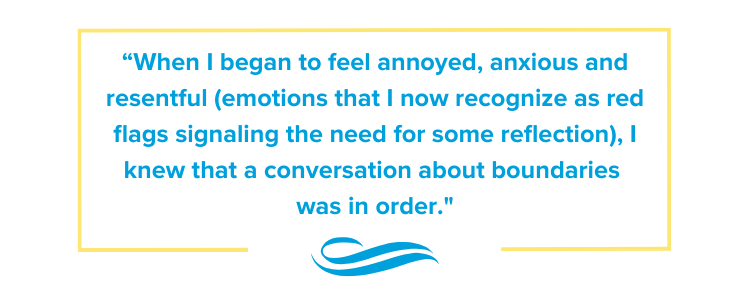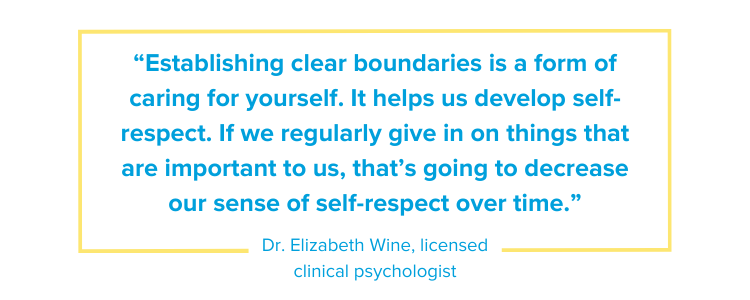“Let’s plan to eat all our meals together,” my new neighbor gushed to the group gathered in our dorm’s lounge, awing me with her social confidence and willingness to take charge. It was college orientation, my first day away from the familiarities of home and high school, and I was thrilled to have ended up on a floor with fellow freshmen who seemed nice, friendly, and eager to connect. Voila! Instant friends and dinner companions: The first hurdles of college life cleared.
In those early days of fall semester, having a quickly-formed and tight-knit group that I knew would be waiting for me in the dining hall lobby after my first day of class, exam, or work-study shift provided the relief and routine that I craved in the midst of so much change. But within a matter of weeks, what had been comforting and enjoyable began to feel constraining. Sleeping in after a late night of studying started to matter more than having a hot breakfast, and I sometimes wanted to grab lunch after a discussion section with new friends from class instead of my usual group.
The problem was that the neighbor whom I felt grateful for on our first day of orientation had meant it when she said that she wanted our dorm circle to eat all of our meals together, and she let friends who ventured outside of her plan know it. Not wanting to cause a fuss — or to be given the cold-shoulder — I kept up with her mealtime schedule for a while. But there came a point when I knew that the level of togetherness was unsustainable, undesirable, and unhealthy. When I began to feel annoyed, anxious and resentful (emotions that I now recognize as red flags signaling the need for some reflection), I knew that a conversation about boundaries was in order.

Why boundaries are necessary
Boundaries, quite simply, are the guidelines that a person creates to identify their expectations and limits in relationships. Brené Brown, a research professor whose work on shame, vulnerability, empathy, and courage has reached millions of people through her viral TED Talk, books, and podcast, writes that “setting boundaries is making clear what’s okay and what’s not okay, and why.”
In my case, my neighbor’s controlling and punitive behavior wasn’t okay. I nervously decided to broach the much-needed conversation about boundaries with her one evening after a pleasant dinner. Though I don’t remember exactly what I said, I do remember that my neighbor responded with a week-long silent treatment. That was too bad, but fortunately, my opting out of some group meals didn’t impact my other friendships on the floor. What I remember more than anything was how good it felt to finally be honest and the sense of confidence that came from stating my boundaries.
Sign up for weekly updates from Amendo!
These satisfied feelings are not unusual when expressing a need for boundaries. I talked to Dr. Elizabeth Wine, a licensed clinical psychologist who explained that, because of her client population (a lot of young adults) and her style of therapy (Dialectical Behavioral Therapy), boundaries come up a lot during her sessions. Dr. Wine tells me, “Establishing clear boundaries is a form of caring for yourself. It helps us develop self-respect. If we don’t set clear boundaries or if we regularly give in on things that are important to us, that’s going to decrease our sense of self-respect over time.”
As I developed longer-lasting relationships in college, I sought out friends and significant others who weren’t as controlling, but that doesn’t mean that the need to define limits disappeared. After all, boundaries aren’t just something that we erect against problematic people; they are a part of every healthy relationship. As Cheryl Strayed (a.k.a. “Dear Sugar”) writes in her book “Tiny Beautiful Things,” “boundaries have nothing to do with whether you love someone or not. They are not judgments, punishments, or betrayals. They are a purely peaceable thing: the basic principles you identify for yourself that define the behaviors that you will tolerate from others, as well as the responses you will have to those behaviors.”
Boundaries are also important in a professional setting. I hear a lot about the importance of cultivating a healthy work-life balance, and boundaries make this balance possible. Some of my professional boundaries are concrete: I set away-messages on my email when I take a vacation, or even head out of town for a long weekend. Others are more amorphous: if a conversation or circumstance at work got to me and I’m having a hard time letting it go, I give myself time (15 minutes will usually do!) to complain and belabor the details to a friend or family member. But then I consciously choose to let it go and focus on other things.

No two sets of boundaries look the same
Because every relationship is unique, no two sets of boundaries look exactly the same. I have different expectations for different people in my life. For instance, I typically draw a pretty clear “no texting conversations” boundary. I don’t multitask well, and so texting derails my concentration in everything from work to spending time with my family. I’ve had to say to several friends, “Hey, I love keeping in touch, but unless it’s something short like making plans, texting isn’t the best form of communication for me. Could we plan to talk on the phone some evening next week instead?”
However, there are a few people in my life with whom I don’t maintain this boundary, such as my mother-in-law. I love staying in touch with her, and texting is one of the ways we are most likely to do so, so I am happy to text back and forth about books, weekend plans and family updates with her. Just because a boundary is important in one relationship doesn’t mean that it has to apply to every one.
Additionally, boundaries can change over the course of time. Early on in my college years, my good friends and I had a tendency to tell each other everything. This felt comfortable until my relationship with my then-boyfriend, now-husband started to get more serious. All of a sudden, discussing the minutiae of our conversations, disagreements, and romantic life with my friends started to feel like a violation of his privacy and the intimacy of our relationship. So I drew a boundary, one that I’ve had to make explicit in many friendships since my college years, since a lot of women feel more comfortable sharing private details from their love lives than I do. It’s also a boundary that I’m aware of in my freelance writing work. I have many opportunities to reflect publicly on my relationship, and sometimes I have really great story ideas based on our marriage. But out of respect for my husband and our relationship, I choose to limit what I share.
While boundaries are essential to maintaining healthy relationships, there is a flip side: I (an introvert with an impulse to be very guarded about my time) need to be careful to not go too far. For example, a friend recently texted me asking if I knew of any babysitters who would be willing to take an early-morning job to help her kids get ready and off to school on a morning when she had an early meeting. With no babysitters to recommend and in the name of boundaries, I could have easily said, “So sorry!!” But my friend was in a moment of need, and I had the time and resources to help her, so I did. There is a time and place for extending ourselves to help others.
A beginner’s guide to setting boundaries
Setting boundaries has never felt exactly easy for me. Even something as seemingly trivial as letting a friend know that I prefer not to have long texting conversations can be awkward. But the alternative — violating a personal boundary or ghosting a friend — is far worse than a single awkward conversation. We can’t expect people to read our minds and know what works for us.
In order to have a productive boundary-setting conversation, Dr. Wine suggests describing the situation very factually from your perspective using I-statements. “Saying ‘I feel anxious, I feel overwhelmed or I feel frustrated when this happens’ versus attacking the other person is probably going to go a long way,” she explains. Then, follow the description of your feelings with a stated need for boundaries: “and therefore I am requesting that we try to do this in the future.”
Wine also recommends explaining how this behavior is going to benefit the relationship, such as decreasing conflict or deepening trust or boosting communication. This reminds the other person that your purpose for boundary setting is strengthening the relationship.
One of the most important series of boundary-setting conversations I’ve had has occurred over the course of time with my husband. Because our backgrounds, individual circumstances, and social-emotional needs are different, we frequently revisit how much together-time, friend-time, and alone-time each of us needs in order to thrive in our relationship and as individuals.

For example, during our first year of marriage, I worked as a hospital chaplain while he completed his master’s degree, which meant that I spent my days listening to and conversing with one patient after the other while he spent his days studying alone. Needless to say, we ended our days with vastly different needs: he, for social stimulation, me, for silence.
Admittedly, it took several weeks of hurt feelings and frustration on both of our parts before we had a productive conversation about desires and expectations and came to a simple solution: Evenings and weekends needed to balance alone-time and quality together-time. For instance, if he planned to meet a friend for drinks at 8 p.m. on a Friday night, I was happy to enjoy a chatty dinner with him when I got home from work at 6, knowing that the rest of my evening could be spent reading alone.
One significant lesson we learned from this experience is the importance of having conversations about boundaries (or any issue involving emotions and consequence, for that matter!) when we’re both feeling recharged and content, not at the end of a long day when we’re both tired and drained.
Boundaries make our lives (and relationships) better
Like most things in life, boundaries aren’t black and white. It takes thoughtfulness, self-understanding, honesty, and practice to figure out appropriate boundaries. But the good news is that boundaries — at least in my experience — facilitate well-being. As Dr. Wine says, “Setting boundaries forces us to do a lot of self-exploration, which only makes us healthier as individuals.”
The other good news is that most of the people in our lives want us to be happy and healthy and they want our relationships to be the best they can be. While initiating a discussion about boundaries can be scary, awkward or vulnerable, the conversation may be more welcomed than you imagine, and either way, the end result is worth it.
